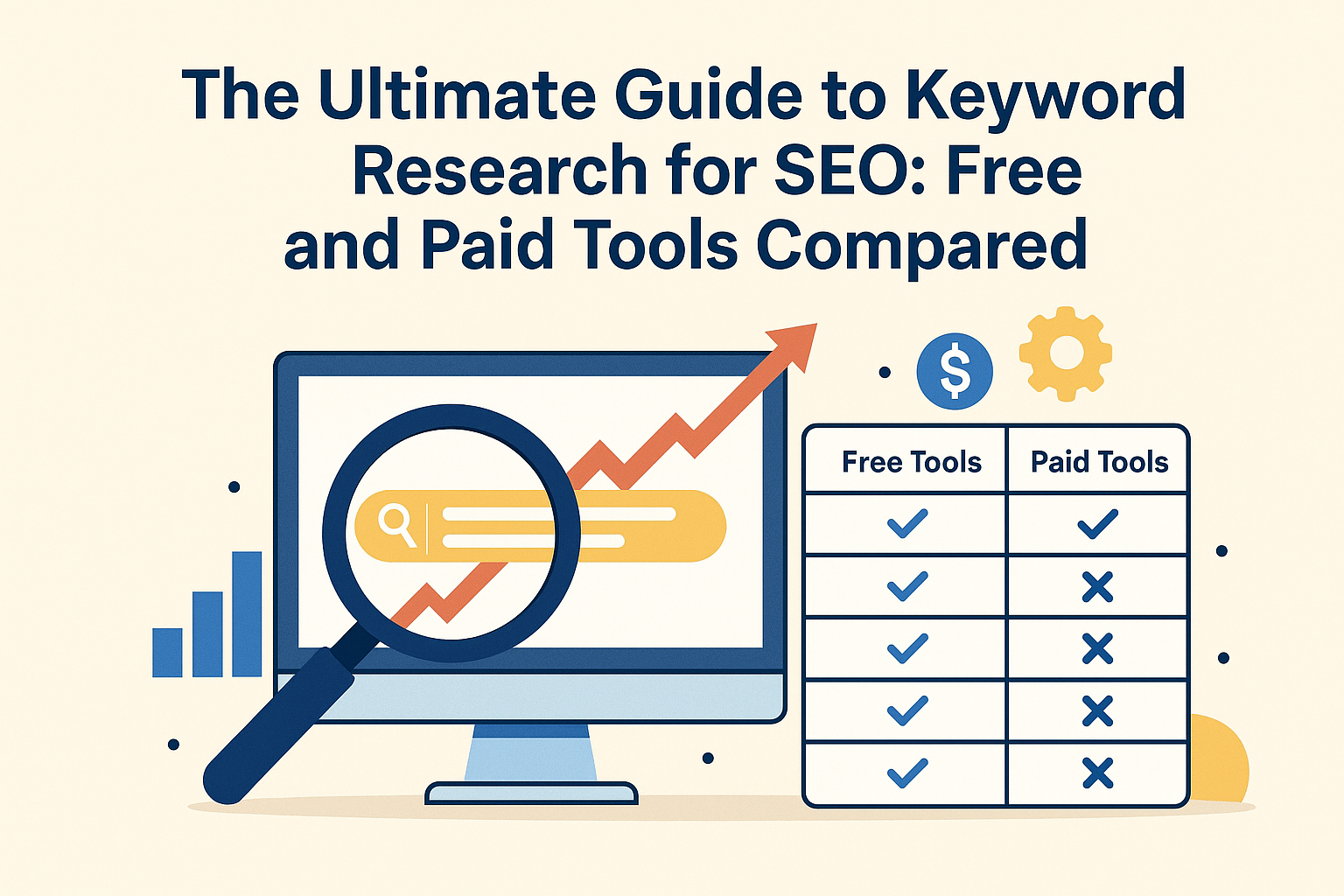The Ultimate Guide to Keyword Research for SEO: Free and Paid Tools Compared

Introduction: Why Keyword Research Still Matters in 2025
You can write the most brilliant blog post in the world — but if no one’s searching for what you wrote, it’s not going to rank. That’s why keyword research remains the backbone of SEO, even in 2025.
Whether you’re a new blogger, digital marketer, or running a full-blown SEO agency, finding the right keywords helps you target the right audience, increase your organic traffic, and outrank your competitors.
But here’s the big question: should you invest in premium tools like Ahrefs or SEMrush, or can free tools get the job done? In this guide, we’ll break down exactly that — comparing top free and paid keyword research tools and showing you how to use them effectively.
What Is Keyword Research and Why Is It Crucial?
Keyword research is the process of identifying the words and phrases your target audience is typing into Google when they search for content, products, or services like yours.
Done right, keyword research:
- Helps you understand searcher intent
- Informs your content strategy
- Identifies ranking opportunities
- Saves you time by focusing on keywords that convert
🎯 Example: Instead of targeting a broad term like “marketing,” you can go for “best digital marketing tools for beginners 2025” — a keyword with clearer intent and less competition.
Free vs Paid Keyword Research Tools: What’s the Difference?
Both free and premium tools can be valuable — but they differ in depth, accuracy, and features.
Let’s compare them side by side:
📊 Keyword Research Tools Comparison Table
| Feature/Tool | Google Keyword Planner | Ubersuggest (Free) | Ahrefs (Paid) | SEMrush (Paid) | AnswerThePublic (Free) |
|---|---|---|---|---|---|
| Search Volume Accuracy | Basic estimates | Decent | Highly accurate | Highly accurate | Vague |
| Keyword Difficulty | ❌ Not available | ✅ Basic | ✅ Advanced | ✅ Advanced | ❌ Not available |
| Competitor Analysis | ❌ | ❌ | ✅ Yes | ✅ Yes | ❌ |
| Content Ideas | ✅ Limited | ✅ | ✅ | ✅ | ✅ Strong |
| Cost | Free | Freemium | Paid ($99+/mo) | Paid ($120+/mo) | Freemium |
Top Free Keyword Research Tools
You don’t need a massive budget to get started. These free tools are surprisingly powerful for beginners and small websites.
1. Google Keyword Planner
- Great for PPC but also useful for SEO.
- Offers keyword ideas and search volume ranges.
- Best used with a Google Ads account.
Tip: Filter by “Low Competition” keywords for blog content opportunities.
2. Ubersuggest by Neil Patel
- User-friendly interface with keyword suggestions, difficulty score, and SEO content ideas.
- Includes domain overview, backlink checker, and rank tracking.
- Limited free searches per day.
Example Use: Type “social media marketing” to get related keywords like “Instagram ads for small business” with volume, CPC, and competition.
3. AnswerThePublic
- Visualizes real user questions from Google and Bing.
- Best for content inspiration and long-tail keywords.
- Limited daily searches unless you upgrade.
Top Paid Keyword Research Tools (and Why They’re Worth It)
For serious SEO professionals or content marketers managing multiple projects, premium tools offer advanced features that can dramatically save time and boost results.
1. Ahrefs
- One of the most trusted SEO tools in the industry.
- Features include keyword explorer, content gap analysis, site audit, and backlink tracking.
- Highly accurate keyword data and difficulty scores.
Use Case: You can spy on your competitors’ top-ranking keywords and target similar or related ones to compete.
2. SEMrush
- All-in-one SEO and PPC toolkit.
- Offers keyword tracking, content templates, site audit, and SEO writing assistant.
- Popular among agencies and freelancers.
Stat: Over 10 million marketers use SEMrush for content and keyword research.
How to Choose the Right Tool for Your Needs
Here’s how to decide which tool is best for you:
Ask Yourself:
- Are you a solo blogger or agency SEO?
- What’s your monthly budget for tools?
- Do you need just keywords, or full SEO analytics?
- Are you writing English content only, or multi-language?
Recommendations:
- Beginners: Start with Ubersuggest or Google Keyword Planner.
- Content Creators: Pair AnswerThePublic with a basic paid tool.
- Professionals/Agencies: Go for Ahrefs or SEMrush — the investment pays off in actionable data and time saved.
Bonus: 5 Practical Keyword Research Tips
Whether you’re using a free or paid tool, these tips can help you maximize results:
- Look for Long-Tail Keywords – They’re easier to rank and more specific (e.g., “best SEO tools for local businesses”).
- Spy on Competitors – See what’s working for similar websites using Ahrefs or SEMrush.
- Check Keyword Difficulty – Avoid terms with 90+ difficulty unless you have a high-authority domain.
- Group Keywords by Topic – Create content clusters that link to a pillar post.
- Track What Works – Use Google Search Console to monitor performance and update content accordingly.
Conclusion: Good Keyword Research Is Half the SEO Battle
You don’t need to guess what your audience wants — tools and data are here to help you make smarter decisions. Whether you stick to free tools or invest in paid platforms, the key is consistency, analysis, and content built on intent-driven keywords.
Remember, SEO isn’t just about ranking — it’s about relevance, helpfulness, and trust. Keyword research is your first step toward all three.
Ready to Start Ranking with the Right Keywords?
Explore more SEO tutorials and tools on rankweb3.in — your one-stop blog for mastering digital marketing.